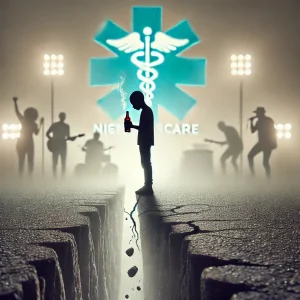
The Digest
Shattered Dreams: The High Cost of Unprotected Sex in Nigeria
Beyond the immediate pleasure lie consequences that reshape lives, communities, and futures. While Nigeria's cultural landscape often discourages open discussion of sexual health, the reality is that unprotected sexual encounters create ripple effects touching everything from educational opportunities to economic stability, especially for young Nigerians building their futures.
Key impacts we often overlook:
- Medical consequences extend far beyond treatment costs to lifetime earning potential
- Educational disruption affects not just individuals but also community development
- Psychological burden creates invisible barriers to future relationship trust
- Family systems face restructuring that affects multiple generations
- Economic impacts compound existing challenges for vulnerable populations
- Social stigma creates isolation when support is most needed
- Prevention strategies exist but remain inaccessible to many
What reproductive health conversations do you wish you'd had earlier in life? The analysis below explores these impacts in greater depth, but your perspectives on breaking these silences may offer valuable insights for others navigating similar challenges.
Explore Complete Analysis
Beyond the Moment: Understanding Long-Term Consequences
In communities across Nigeria, from urban centres to rural villages, unprotected sexual encounters create consequences that extend far beyond the moment. While cultural norms often discourage open discussion of sexual health, the silence itself contributes to preventable suffering that reshapes individual lives and community futures.The impacts are particularly profound for young Nigerians building educational foundations and career pathways. When sexual health education remains taboo, the resulting knowledge gaps leave them vulnerable to life-altering consequences they may not fully comprehend until it's too late.
Healthcare professionals consistently report seeing young people arriving at health facilities only after conditions have advanced significantly. In many cases, patients express that with earlier knowledge, they would have made different choices.
Multiple Dimensions of Impact
Health Trajectories Permanently Altered
When sexually transmitted infections go undetected or untreated—as frequently happens in environments where seeking care carries stigma—the health implications can extend throughout a lifetime.Critical Health Challenges:
- HIV/AIDS continues to affect approximately 1.9 million Nigerians, with young women disproportionately impacted
- Untreated infections like chlamydia and gonorrhoea can lead to infertility, affecting future family formation
- Cervical cancer, linked to HPV transmission, remains a leading cause of cancer deaths among Nigerian women
- Pregnancy complications increase when prenatal care is delayed due to unplanned conception
- Mental health struggles often follow, yet remain unaddressed due to limited psychological support services
Educational Dreams Deferred
For many young Nigerians, education represents personal advancement and the hopes of entire families. When unprotected sex leads to pregnancy or health complications requiring extensive treatment, educational journeys often terminate prematurely.Research from Nigeria's Ministry of Education indicates that approximately 60% of young women who experience unplanned pregnancies do not return to complete their education. This interruption creates lifetime earning limitations that affect individuals and family systems dependent on their potential income.
Men's education also faces disruption, though in different patterns. Young fathers often leave school to seek immediate employment, frequently in informal sectors with limited advancement opportunities, creating long-term economic vulnerability.
Economic Stability Compromised
The financial implications of unprotected sex extend beyond immediate medical costs to include profound economic ripple effects that can persist for generations.Financial Dimensions Include:
- Direct healthcare costs for STI treatment or pregnancy care
- Income loss during illness or pregnancy
- Reduced lifetime earning potential due to educational interruption
- Childcare expenses for unplanned pregnancies
- Resources diverted from family savings or business investment
- Potential job loss or discrimination in employment
Family Systems Reshaped
When unplanned pregnancies occur, the impacts extend throughout family systems, often requiring significant restructuring of roles and responsibilities.Grandparents frequently become primary caregivers while young parents attempt to stabilise their situations. Siblings may see educational opportunities limited as resources shift to address immediate needs. Extended family members often provide critical support but may experience strain on their resources and relationships.
Sociological research indicates that while family systems demonstrate remarkable resilience, this adaptation often comes with significant costs to educational advancement, economic stability, and emotional well-being across multiple family members.
Breaking Cycles Through Knowledge and Access
Despite these serious consequences, evidence suggests that straightforward interventions can significantly reduce adverse outcomes.Information as Prevention
Comprehensive sexual health education—covering not just biological facts but relationship dynamics, consent, and decision-making—has demonstrated effectiveness in reducing risky sexual behaviour. Yet such education remains inconsistently implemented across Nigerian educational settings.Youth-led peer education programmes in states like Lagos and Rivers have shown promising results in creating culturally appropriate spaces for honest conversation. These programmes acknowledge the reality that young people will make their own decisions, while equipping them with accurate information to make choices that protect their futures.
Access to Preventive Care
Beyond information, access to preventive tools and services remains crucial yet limited in many communities.Urban-rural disparities in healthcare access remain stark, with rural residents often travelling significant distances for basic reproductive health services. Cost barriers further limit access, particularly for young people who may lack independent financial resources.
Community health workers have emerged as vital bridges, connecting vulnerable populations with services while providing culturally sensitive guidance that acknowledges local values and promotes health-protective behaviours.
Looking Forward: From Silence to Solutions
The consequences of unprotected sex in Nigeria remain serious, yet not inevitable. Moving forward requires acknowledging several realities:- Cultural silence has not prevented sexual activity, but has prevented safe sexual practices
- Young people make their own decision,s but need accurate information to make informed ones
- Prevention costs far less—economically, socially, and emotionally—than addressing consequences
- Community-based approaches that respect cultural values while promoting health show the most promise
Community Perspectives
What reproductive health information do you wish you had received earlier in life? How might we create culturally appropriate spaces for these crucial conversations? Share your insights below to help others navigate these critical decisions.




